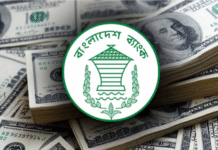
The Financial Institution Division has directed the state-run financial entities to check any leak of ‘confidential’ information as reports on scams frequently grabs the headlines in local and international media tarnishing image of the ruling party.
Officials said that the division gave the directive in a letter on February 1 asking the
Bangladesh Bank, state-owned commercial banks and other financial entities to take necessary measures so that no confidential information relating to intelligence and security could be exposed to any person beyond the authorities concerned.
In a coincidence, Awami League lawmaker Muhiuddin Khan Alamgir, also former chairman of scam-hit Farmers Bank, on Monday urged the speaker to issue a ruling asking the Bangladesh Bank governor not to give information to reporters about disbursement of loans by private commercial banks.
Former central bank deputy governor Ibrahim Khaled said that it seemed that the government wanted to suppress the loan scams that should not happen for the wellbeing of the banking sector.
Instead the government should take remedial measures scrutinising the media reports on scams, he said.
On a point of order, Muhiuddin claimed that reports published in the media on the basis of central bank information over the loan irregularities against him were baseless.
He said that appropriate measures should be taken so that the central bank could not reveal private commercial bank’s loan distribution information that, according him, helped newspapers to publish ‘imaginary reports’.
He noted that none could provide private bank’s information to media as per the Bangladesh Bank Order.
On November 27, 2017, Muhiuddin resigned as the Farmers Bank chairman after the central bank had asked him to quit because of severe liquidity crisis caused by unbridled corruption and misappropriation of funds.
Farmers Bank, which was given licence in 2013 reportedly on political consideration, cannot return fund to depositors.
Not only the Farmers Bank but also many others banks including state-owned Sonali, Janata and BASIC banks had suffered loan scams since the beginning of the back-to-back five year tenure of the Awami League-led government in 2009.
Sonali Bank that suffered the single biggest loan scam of Tk 3,500 crore to little known Hallmark Group in 2012-13 was yet to recover a single penny.
Once profit-making BASIC Bank became almost bankrupt after it lost about Tk 6,000 crore loan extended to fictitious borrowers by controversial board of directors led by former BASIC Bank chairman Abdul Hye appointed allegedly on political consideration
Besides, the country’s reserve theft by suspected hackers from the central bank account in New York Federal Reserve in 2016 hogged the headline of world media.
The directives to the state-run financial entities by the Financial Institution Division also coincided with yet another loan scam worth Tk 5,500 crore state-owned Janata Bank provided to AnonTex Group violating rules.
The AtonTex loan scam was revealed in January.
Officials said that the division sent the letter to the Bangladesh Bank, Insurance Development and Regulatory Authority, all the state-run banks, Bangladesh Insurance Academy, Investment Corporation of Bangladesh, Bangladesh NGO Foundation, Bangladesh Securities and Exchange Commission, UAE Bangladesh Investment Company, Bangladesh Commerce Bank and others.
Financial Institution Division secretary Eunusur Rahman, however, denied that the directive was given to prevent media from getting information on loan scams that plagued the state-owned banks.
Talking to New Age on Monday at his office, Eunusur said that such directive was not new at all and had been given on many occasions in the past.
He noted that the directive was a reminder given as part of bureaucratic exercise.
Officials said that the move came after the cabinet approved the Digital Security Bill on January 29, incorporating controversial Section 57 of the Information and Communication Technology Act 2006, which, many feared, would curb the freedom of expression.
Source: New Age.









